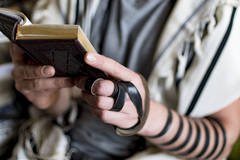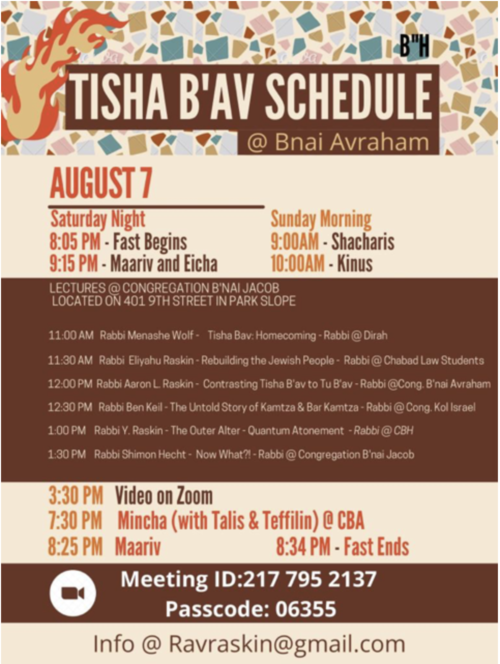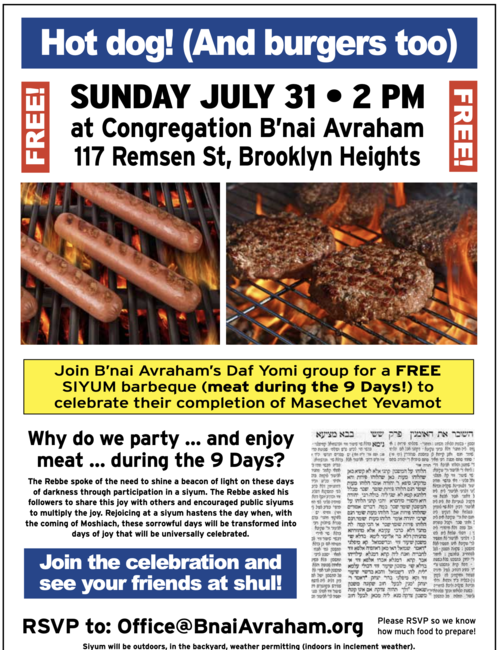President's Message 8.5.22
| Author | |
| Date Added |
Dear friends,
This week, we read Parshat Devarim on Tisha B'Av, the saddest day of the Jewish year when we mourn the destruction of both Holy Temples.
There are differing customs as to how to treat Shabbat Tisha B'Av. The most common tradition is to celebrate Shabbat Tisha B'Av as a regular Shabbat, with all of its inherent joy and spirituality, and then fast after Havdalah through the next day on the 10th of Av.
Rabbi Beryl Wein, in his commentary of the Parsha and the nine days, believes that the reading of Devarim may make up for delaying the fast, as it a listing of all of the mistakes and missteps that the Israelites committed through their forty years of wandering. The episodes not only bring the past into sharp focus, but are also the harbingers of the future disasters that will befall the Jewish people, including the destruction of the Temples.
Throughout the retelling, however, Moshe displays disappointment but does not berate. He does not threaten the inevitable success of the Jewish people in attaining redemption. The same dichotomy we see with retelling the sins of the past while still referencing the promise of the future, it's the same lesson we see with Shabbat and Tisha B'Av. We see that when the two fall on the same day, Shabbat trumps Tisha B'Av. We mourn the destruction, but we also pray for redemption.
Tisha B'Av is transitory but Shabbat is eternal. We have to remember our mistakes and learn from them, but more than that, we have to keep looking forward. And remember that prioritizing the lessons of Shabbat allow us to live more fully.
• • •
Culminating the nine days, we have a full Tisha B'Av roster of services and inspiring lectures throughout the day. See the flyer abovefor the full list.
Speaking of the nine days, I want to thank everyone who came and celebrated our backyard siyyum barbecue with us. Now that we have done this twice, next year will be a chazakah and it will make a great tradition of siyyumim at CBA.
The shul’s Code of Conduct and the minutes from the previous board meeting were sent to the membership this week, and I hope to have the mid-year budget information available for next week. And I'm happy to announce that an assistant for the Rabbi started this week.
The Israel lecture series dates are being confirmed, and the Rabbi is also planning lectures and Shabbatonim for after the Chaggim. Stay tuned for these dates.
Rosh Hashanah and Yom Kippur are right around the corner. The plan is to continue with outdoor davening in the tent. Feedback from last year indicates the tent was the overwhelming preference so we will be sticking with it. We will have Chazzan Goodman and Rabbi Shushan leining all of the services for both Rosh Hashanah and Yom Kippur. We are also considering auctioning off aliyot and Psichot for Yom Kippur this year. More to come on this.
Lastly, we’ve been in touch with the NYPD and they will be conducting a security survey in the next few weeks to provide recommendations about staffing and physical improvements we can implement. In the meantime, I urge everyone who uses the Synagogue building to make sure the front door is locked after coming in and to not allow entry to anyone they don’t know. Ask questions or tell someone if you see anything questionable. We all have to work together to protect our Shul.
Wishing you all a peaceful and meaningful Shabbat Shalom as well as an
easy and meaningful fast.
Steven Inker
Sun, November 9 2025
18 Cheshvan 5786
Today's Zmanim
| Alos Hashachar | 5:12am |
| Earliest Tallis | 5:44am |
| Netz (Sunrise) | 6:35am |
| Latest Shema | 9:07am |
| Zman Tefillah | 9:58am |
| Chatzos (Midday) | 11:40am |
| Mincha Gedola | 12:05pm |
| Mincha Ketana | 2:37pm |
| Plag HaMincha | 3:40pm |
| Shkiah (Sunset) | 4:44pm |
| Tzais Hakochavim | 5:26pm |
| More >> | |
Follow Congregation B'nai Avraham's Social Media channels
 If you're on Social Media, follow our shul.
If you're on Social Media, follow our shul.
__________________________
•YouTube (Bnai Avraham)
__________________________
•WhatsApp Daily/Main Minyan
•WhatsApp Hasgacha Minyan
•WhatsApp General Chat
•WhatsApp Sisterhood
To join any of the above WhatsApp groups, write to request an invite: Shternieraskin@gmail.com
__________________________
•WhatsApp Daf Yomi
To join the Daf Yomi group, write to request an invite:
__________________________
Click here to read some of what the Rebbe said about the use of technology in spreading words of Torah.
Jewish News Links
These external news links provide general information and their listing here in no way implies an endorsement.
Brooklyn News Links
These external news links provide general information and their publication here in no way implies an endorsement.
Candlelighting Times
B'nai Avraham is your Brooklyn Heights shul
117 Remsen St
Between Clinton and Henry
streets in Brooklyn Heights
Shabbos

FRIDAY Mincha and Kabbalat Shabbat/Maariv): 7 pm during the summer
SATURDAY: Shacharit 8 am and 10 am
Mincha/Maariv: at candellighting time
[Note: a single Shabbos Shacharit minyan at 9 am takes place yom tovim, shabbatons, smachot, US holiday weekends, and summer from Independence Day through Labor Day. ]
KIDDUSH THIS WEEK is sponsored by Ed and Julie Rubinchik, in honor of Joshua’s graduation from Tulane. Yippee-ay-yay and mazal tov!
And Kiddush next week is sposored by Marty Baumrind, in honor of his mother‘s 95th birthday. It falls on Tisha B'Av on both her Hebrew and English birthdays this year, quite unusual. Thanks very much, Marty!
Weekday Minyanim

.
.
To receive timely weekday minyan updates, please join the WhatsApp group. Write office@bnaiavraham.org to join.
SHACHARIS
Monday to Friday: 7:45 am
Sunday: 8:45 am
MINCHA/MAARIV:
Sun: at candle-ighting time
Monday thru Thursday: 8 pm
Let's Learn! Classes this week at CBA
Schedule subject to change
•Sunday 11:00 am
The David Berg Lecture Series
Perkei Avot study with Rabbi Aaron Raskin. In person and on Zoom.
Meeting ID 217 795 2137. Passcode 06355
•Monday 8:15 pm
Halacha with Rabbi Yankel Raskin (in person). Email heightsrabbi@gmail.com for more information.
•Monday 8:30 pm
Daf Yomi (on Google Meet)
For link write: Mark_Zelcer@gmail.com
•Tuesday 8:15 pm
Parsha with Rabbi Hubner, in person and click here for Zoom.
•Wednesday 9:15 am
Parsha class for women
with Rabbi Raskin.
In person or on Zoom:
Meeting ID 217 795 2137.
Passcode 06355
Thursday 9:30 am
Maamar: Chassidic DIscourses on the upcoming holidays
Meeting ID 217 795 2137.
Passcode 06355
Thursday 8:30 pm
Daf Yomi (see Monday)
•Saturday 9:30 pm
Daf Yomi (see Monday)
Join Our Mailing List
Stay in touch with the shul. Choose what communications you'd like to receive.






